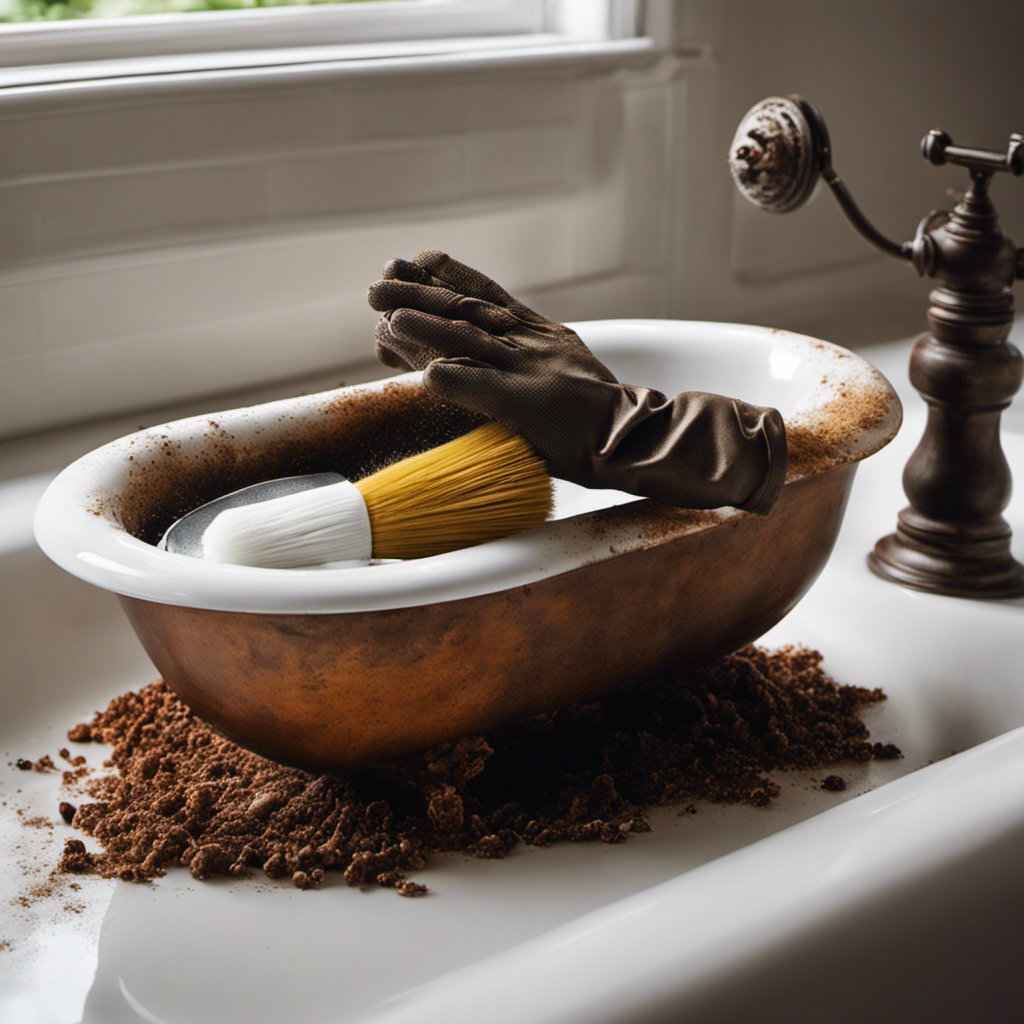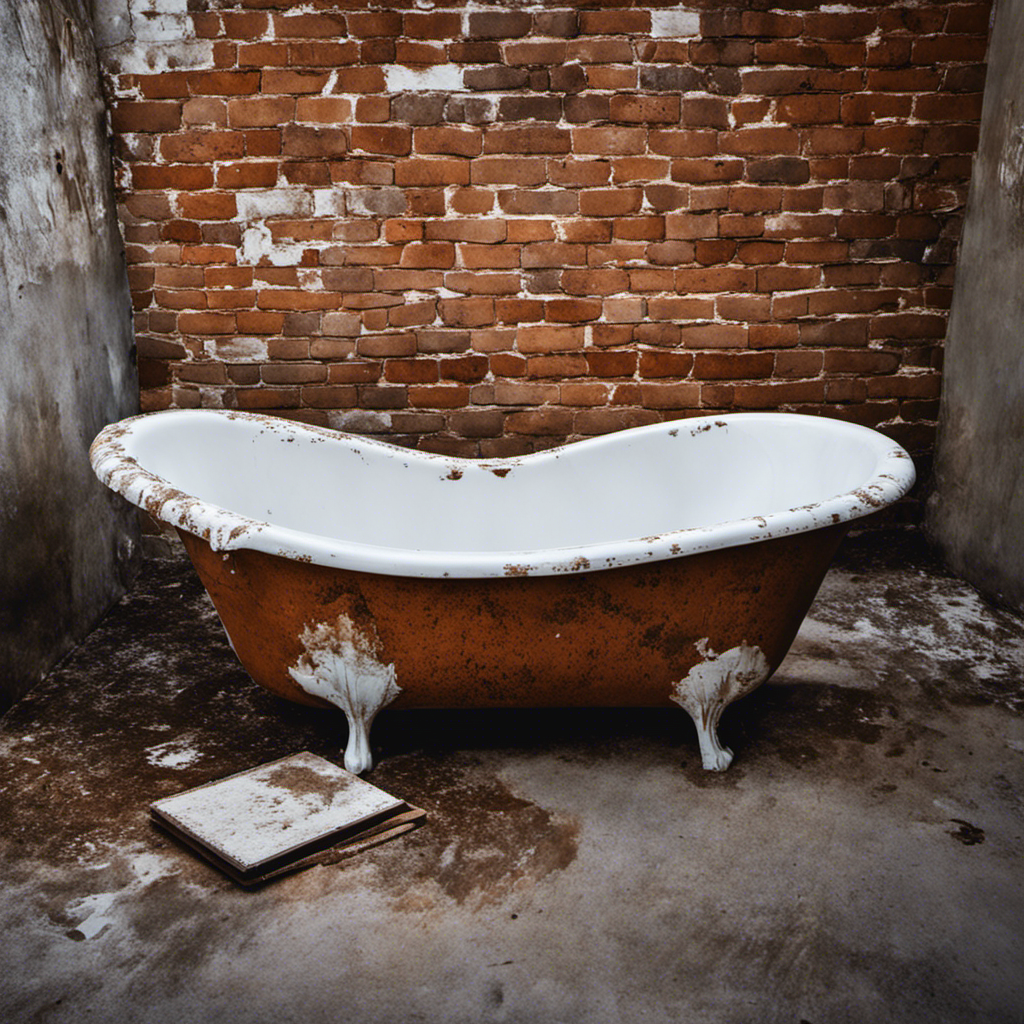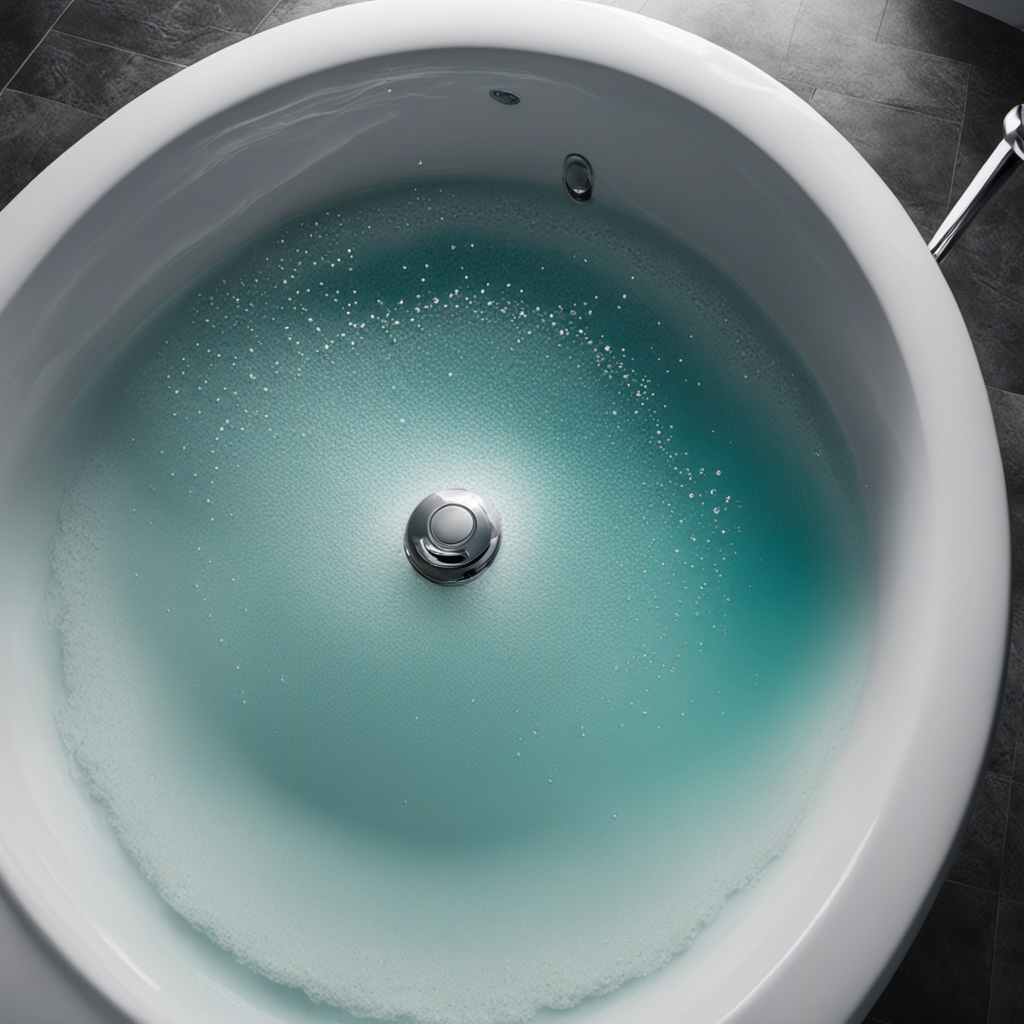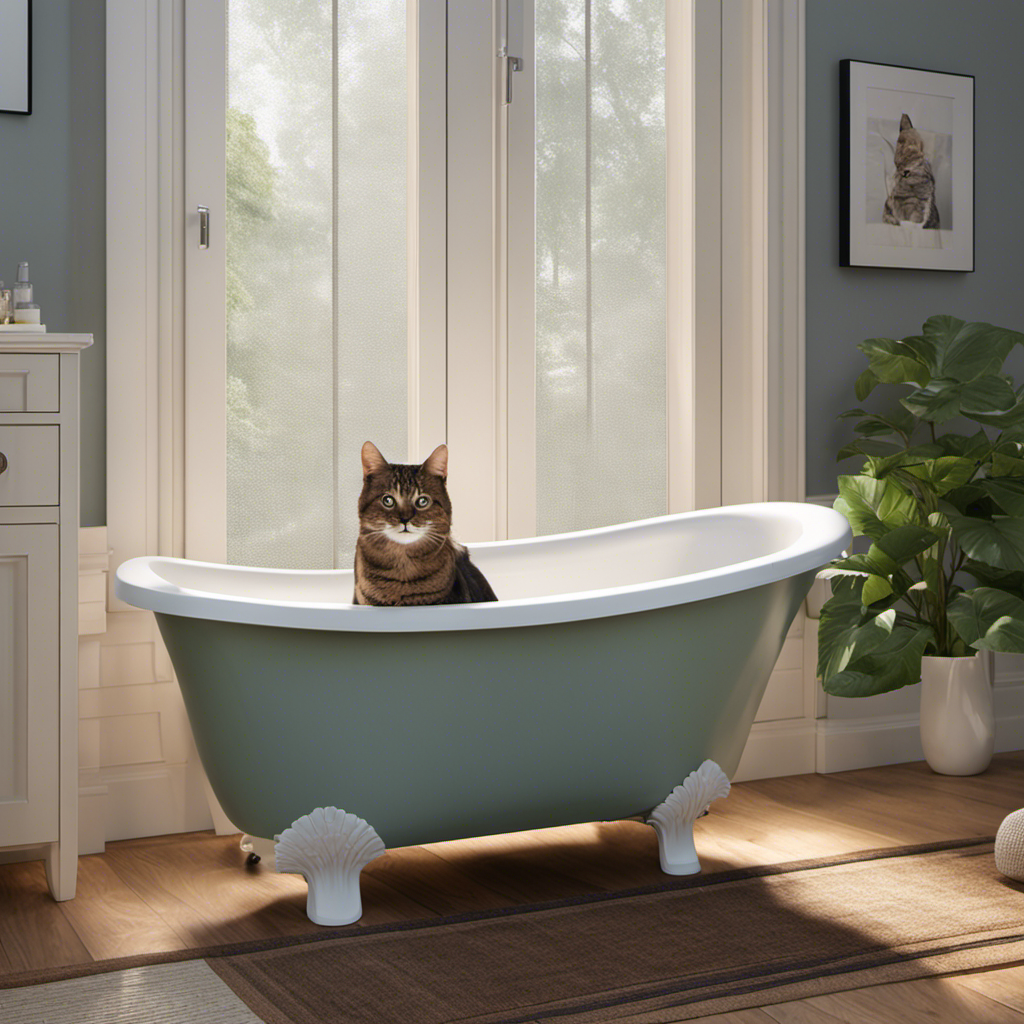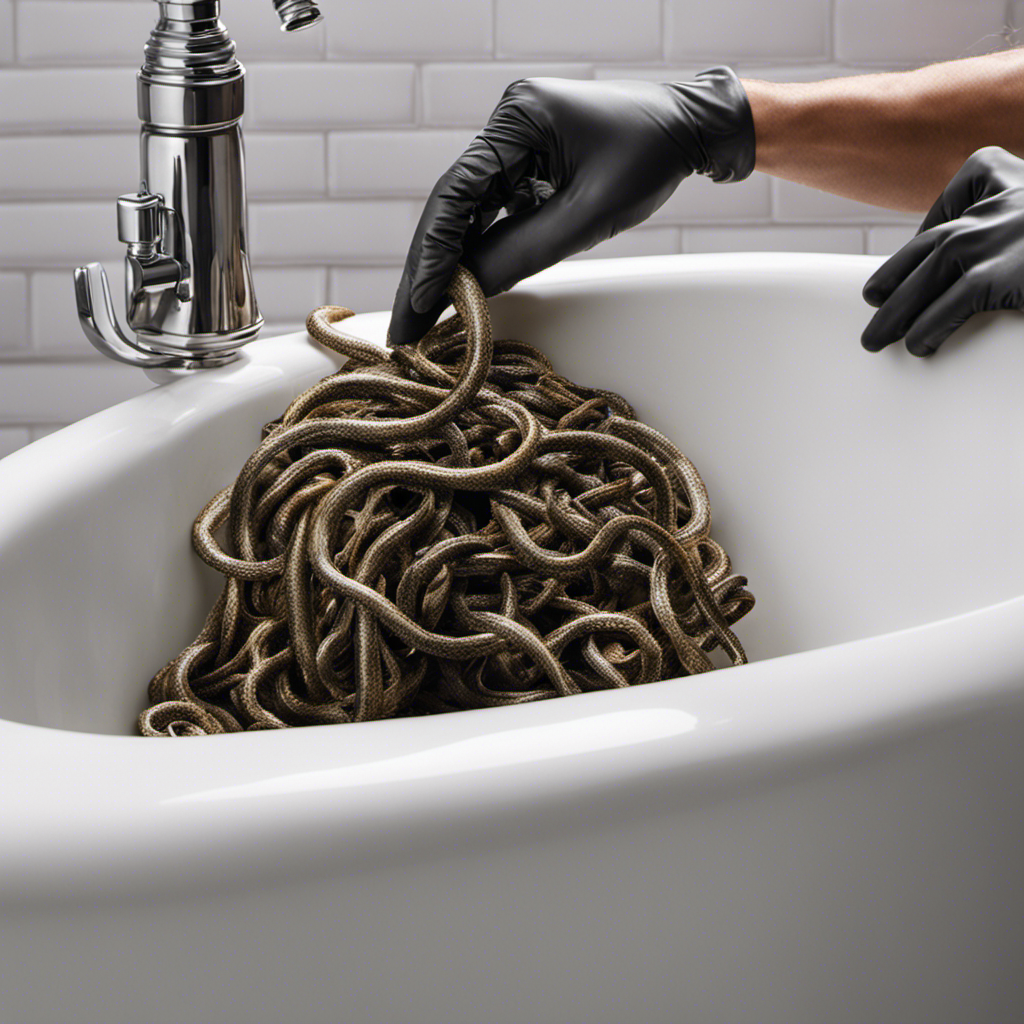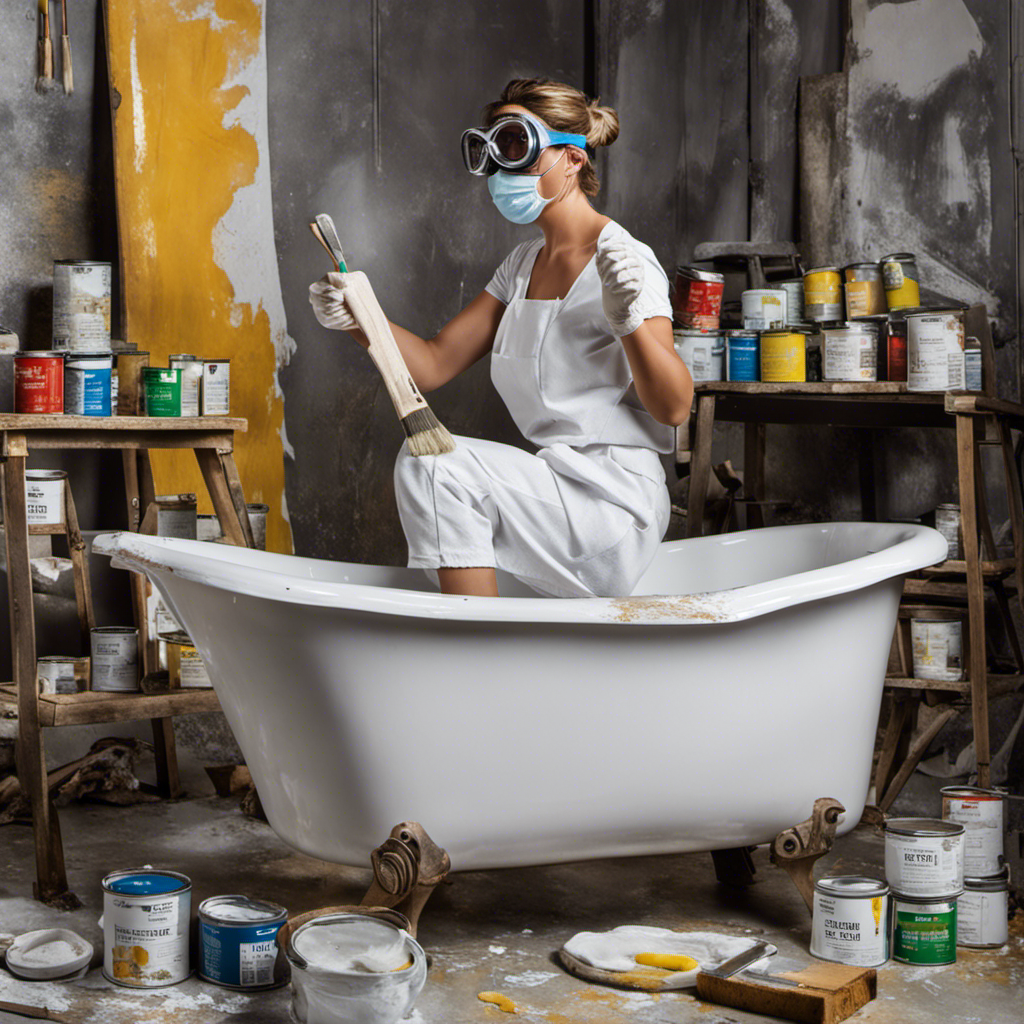So, you’ve noticed some stubborn rust stains on your bathtub, huh? Well, fear not! I’m here to share my tried and tested techniques for removing rust from your bathtub.
With just a few simple tools and some common household ingredients, you’ll be able to say goodbye to those unsightly stains in no time.
From the power of vinegar and baking soda to the effectiveness of lemon juice and salt, I’ve got you covered.
So, let’s dive in and restore your bathtub to its former glory!
Key Takeaways
- Rust formation in bathtubs is caused by water exposure and improper cleaning and maintenance.
- Prevent rust by keeping the bathtub dry and clean, wiping surfaces after each use, and fixing leaks or cracks.
- Gather the necessary tools and materials such as rust removal products, protective gear, and cleaning supplies.
- Use vinegar, lemon juice, or baking soda to effectively remove rust from the bathtub, while practicing safety precautions.
Understanding the Rust Problem
To understand the rust problem in your bathtub, you’ll need to take a closer look at the affected areas.
Rust formation in bathtubs is a common issue that can be caused by several factors. One of the most common causes is water exposure. When water comes into contact with metal surfaces, it can create a chemical reaction that leads to rust.
Another common cause is improper cleaning and maintenance. If you don’t regularly clean and dry your bathtub, moisture can accumulate and promote rust formation.
To prevent rust from forming in your bathtub, it’s important to keep it dry and clean. This can be done by wiping down the surfaces after each use and fixing any leaks or cracks.
By understanding the common causes of bathtub rust and taking preventative measures, you can keep your bathtub rust-free for longer.
Now that we understand the rust problem, let’s move on to gathering the necessary tools and materials.
Gathering the Necessary Tools and Materials
Make sure you have all the tools and materials you’ll need for the task at hand. Here are some essential items to gather before starting the rust removal process on your bathtub:
-
Rust removal products: Look for products specifically designed for removing rust stains from surfaces like bathtubs. These can include rust removers, rust converters, or rust inhibitors.
-
Protective gear: It’s important to prioritize safety when dealing with chemicals. Wear gloves, goggles, and a mask to protect yourself from any potential harm.
-
Cleaning supplies: Gather a sponge, scrub brush, or scouring pad to help with the cleaning process.
-
Cloth or towel: Having a cloth or towel nearby will allow you to wipe away excess product or moisture as needed.
By ensuring you have these tools and materials ready, you’ll be fully prepared to tackle the rust removal process.
Now, let’s move on to preparing the bathtub for rust removal.
Preparing the Bathtub for Rust Removal
Before starting, gather all the necessary tools and materials for preparing the bathtub for rust removal.
It is crucial to properly prepare the bathtub to ensure effective rust removal. The first step is to thoroughly clean the surface using a mild detergent and warm water. This will remove any dirt or grime that may interfere with the rust removal process.
Once the bathtub is clean, it is important to scrub the rusted areas using a stiff brush or sponge. This will help to loosen and remove any loose rust particles. Scrubbing is an essential step as it prepares the surface for the next step of using vinegar and baking soda to remove the rust.
Using Vinegar and Baking Soda to Remove Rust
When it comes to removing rust, vinegar is a highly effective and inexpensive option. Not only does vinegar dissolve rust, but it also helps prevent further corrosion.
However, there are alternative methods available for rust removal, such as using lemon juice or baking soda.
It’s important to take safety precautions when using vinegar or any other rust removal method, such as wearing gloves and ensuring proper ventilation.
Effectiveness of Vinegar
Using vinegar is an effective way to remove rust from a bathtub. As someone who has tried various methods, I can confidently say that vinegar works wonders in tackling rust stains. Not only is it affordable, but it is also readily available in most households.
However, if you don’t have vinegar on hand or prefer to explore alternatives, there are a few options to consider. Lemon juice, for instance, contains citric acid which can help break down rust. Another alternative is using a mixture of baking soda and hydrogen peroxide, which creates a paste that can be applied to the affected area.
To prevent future rusting, it is essential to practice rust prevention techniques such as keeping the bathtub dry, using rust-resistant coatings, and regularly cleaning and maintaining the surface.
Alternative Rust Removal Methods
After exploring the effectiveness of vinegar as a rust remover, let’s delve into alternative methods to tackle that pesky rust in your bathtub. There are several rust removal hacks you can try that utilize natural ingredients you probably already have at home. These natural rust removers are not only effective but also safe for the environment and your health.
One popular method involves using a mixture of lemon juice and salt. The citric acid in the lemon juice helps dissolve the rust, while the abrasive nature of salt helps scrub it away. Another option is to create a paste using baking soda and water. This paste can be applied directly to the rusted areas and left for a few hours before scrubbing it off.
To help you compare these methods, here is a table showcasing the ingredients and steps for each:
| Method | Ingredients | Steps |
|---|---|---|
| Lemon juice and salt | Lemon juice, salt | 1. Mix lemon juice and salt. 2. Apply the mixture to the rusted areas. 3. Let it sit for a few hours. 4. Scrub off the rust. |
| Baking soda paste | Baking soda, water | 1. Mix baking soda and water to form a paste. 2. Apply the paste to the rusted areas. 3. Let it sit for a few hours. 4. Scrub off the rust. |
With these natural rust removal methods at your disposal, you can say goodbye to that unsightly rust in your bathtub and enjoy a clean and shiny surface once again.
Safety Precautions When Using Vinegar
To ensure your safety, it’s important to take certain precautions when handling vinegar for rust removal.
Vinegar is a commonly used household item for removing rust, but it can be harmful if not used correctly. Here are some safety tips to prevent accidents and protect your skin:
-
Wear protective gloves: Vinegar is acidic and can irritate or burn your skin. Wearing gloves will provide a barrier of protection.
-
Use in a well-ventilated area: Vinegar can produce strong fumes, so make sure to open windows or use it in a well-ventilated room to avoid inhaling the fumes.
-
Avoid contact with eyes: If vinegar gets into your eyes, it can cause irritation and damage. Be careful to keep it away from your eyes during use.
-
Store properly: Keep vinegar in a tightly sealed container and out of reach of children to avoid accidents.
Trying Lemon Juice and Salt as a Rust Remover
You can try using a mixture of lemon juice and salt as a rust remover for your bathtub.
Lemon juice is known for its acidic properties, which can help break down rust and stains. The natural citric acid in lemon juice acts as a mild bleach and can effectively remove rust without damaging the surface of your bathtub.
When combined with salt, which acts as a gentle abrasive, the mixture becomes even more effective at removing stubborn rust stains. The chemistry behind this method lies in the reaction between the citric acid and the iron oxide present in rust. The acid breaks down the rust, while the salt helps to scrub away the loosened particles.
This combination of lemon juice and salt is a safe and eco-friendly alternative to chemical rust removers.
Applying Commercial Rust Removers
When it comes to applying commercial rust removers, it is important to consider the effectiveness of different products. To make an informed decision, comparing the effectiveness of various rust removers can be helpful.
Additionally, safety precautions for usage should not be overlooked, as some products may contain harsh chemicals that require careful handling to avoid any potential hazards.
Product Effectiveness Comparison
The vinegar and baking soda method is more effective at removing rust from a bathtub than the lemon juice method. When comparing the two, it is clear that the vinegar and baking soda combination provides better results.
Here are some key points to consider when comparing these rust removers:
- Vinegar and baking soda create a chemical reaction that helps to break down rust.
- Lemon juice contains citric acid, which can also dissolve rust to some extent.
- Vinegar is a stronger acid than lemon juice, making it more effective at removing stubborn rust stains.
- Baking soda acts as an abrasive agent, aiding in the scrubbing away of rust particles.
Safety Precautions for Usage
To ensure your safety while using the vinegar and baking soda method, it’s important to wear gloves and protective eyewear. These safety equipment recommendations are essential in preventing any potential risks and hazards that may arise during the rust removal process.
When dealing with rust, it’s important to be aware of the corrosive nature of the chemicals involved. Vinegar and baking soda, while effective in removing rust, can be harmful if they come into contact with your skin or eyes. By wearing gloves and protective eyewear, you can minimize the risk of any chemical burns or irritations.
Taking these precautions will allow you to safely proceed with the rust removal process and move on to the next step of sanding the rust off the bathtub.
Sanding the Rust Off the Bathtub
Start by gently sanding the rust off the bathtub using a fine-grit sandpaper. This will help to remove the surface rust and prepare the bathtub for further treatment.
Here are some effective sanding techniques and rust prevention methods to consider:
- Use a sanding block or sandpaper wrapped around a sponge for better grip and control.
- Begin with light pressure and gradually increase as needed.
- Sand in a circular motion to evenly remove the rust.
- Rinse the area regularly to remove loose rust particles and prevent scratching.
To prevent future rusting, consider applying a rust-inhibiting primer or coating after sanding. This will provide a protective barrier against moisture and prevent rust from forming again. Remember to follow the manufacturer’s instructions for the primer or coating application.
With proper sanding techniques and rust prevention methods, you can restore your bathtub to its former glory and protect it from further rust damage.
Painting and Sealing the Bathtub to Prevent Future Rust
After sanding, you can apply a rust-inhibiting primer or coating to protect the bathtub from future rust. This step is crucial in the bathtub refinishing process as it ensures long-term rust prevention.
Rust can be a persistent problem in bathtubs, especially in areas with high moisture levels. By applying a rust-inhibiting primer or coating, you create a barrier that prevents moisture from reaching the metal surface and causing rust to form.
These primers and coatings are specifically designed to resist rust and provide a durable finish that will last for years. It is important to choose a high-quality product that is specifically formulated for bathtub refinishing to ensure the best results.
Maintenance Tips to Keep Your Bathtub Rust-Free
Regularly cleaning and drying your bathtub after each use will help prevent rust from forming and keep your bathtub in great condition. Here are some maintenance tips to keep your bathtub rust-free:
-
Use a mild, non-abrasive cleaner: Avoid harsh chemicals that can damage the surface of your bathtub. Instead, opt for a mild cleaner specifically designed for bathtubs.
-
Scrub gently: Use a soft sponge or cloth to scrub the surface of your bathtub. Avoid using abrasive scrub brushes or steel wool, as they can scratch the surface and make it more prone to rust.
-
Dry thoroughly: After cleaning, make sure to dry your bathtub completely to prevent moisture from lingering and causing rust. Use a clean towel or a squeegee to remove any excess water.
-
Apply a protective coating: Consider applying a protective coating, such as a bathtub sealant, to further prevent rust buildup. This will create a barrier between the metal surface and moisture, reducing the chances of rust forming.
Frequently Asked Questions
Can I Use Bleach to Remove Rust From My Bathtub?
Yes, you can use bleach to remove rust from your bathtub. However, there are alternative methods for removing rust as well. It’s important to follow safety precautions and test a small area first.
How Long Does It Take for Vinegar and Baking Soda to Remove Rust From a Bathtub?
I’ve found that using vinegar and baking soda is a great way to remove rust from a bathtub. It’s a simple, effective method that doesn’t take long to work its magic.
Is It Safe to Use Lemon Juice and Salt on a Bathtub With Enamel Coating?
Using lemon juice and salt on an enamel-coated bathtub may not be safe as it can potentially damage the enamel. It is best to use alternatives such as a mild detergent or specialized cleaning products for enamel bathtubs.
Can I Use a Wire Brush to Sand off Rust From My Bathtub?
Yes, using a wire brush can be effective for removing rust from a bathtub. However, be careful not to damage the surface. Alternatives like sandpaper or rust removers may also work well.
How Often Should I Reseal My Bathtub to Prevent Future Rust?
To prevent future rust, it is important to reseal your bathtub regularly. The frequency of resealing depends on the type of product used, but generally it is recommended to do it every 1-2 years. High-quality sealants are the best for preventing rust.
Conclusion
In conclusion, removing rust from your bathtub is a task that requires patience and the right tools. By using vinegar, baking soda, lemon juice, or commercial rust removers, you can effectively eliminate rust stains.
Sanding the bathtub and applying a fresh coat of paint will not only remove the rust but also add a protective layer. Remember to regularly maintain your bathtub to prevent future rust.
With these tips, you can keep your bathtub rust-free and enjoy a clean and shiny bathroom sanctuary!
